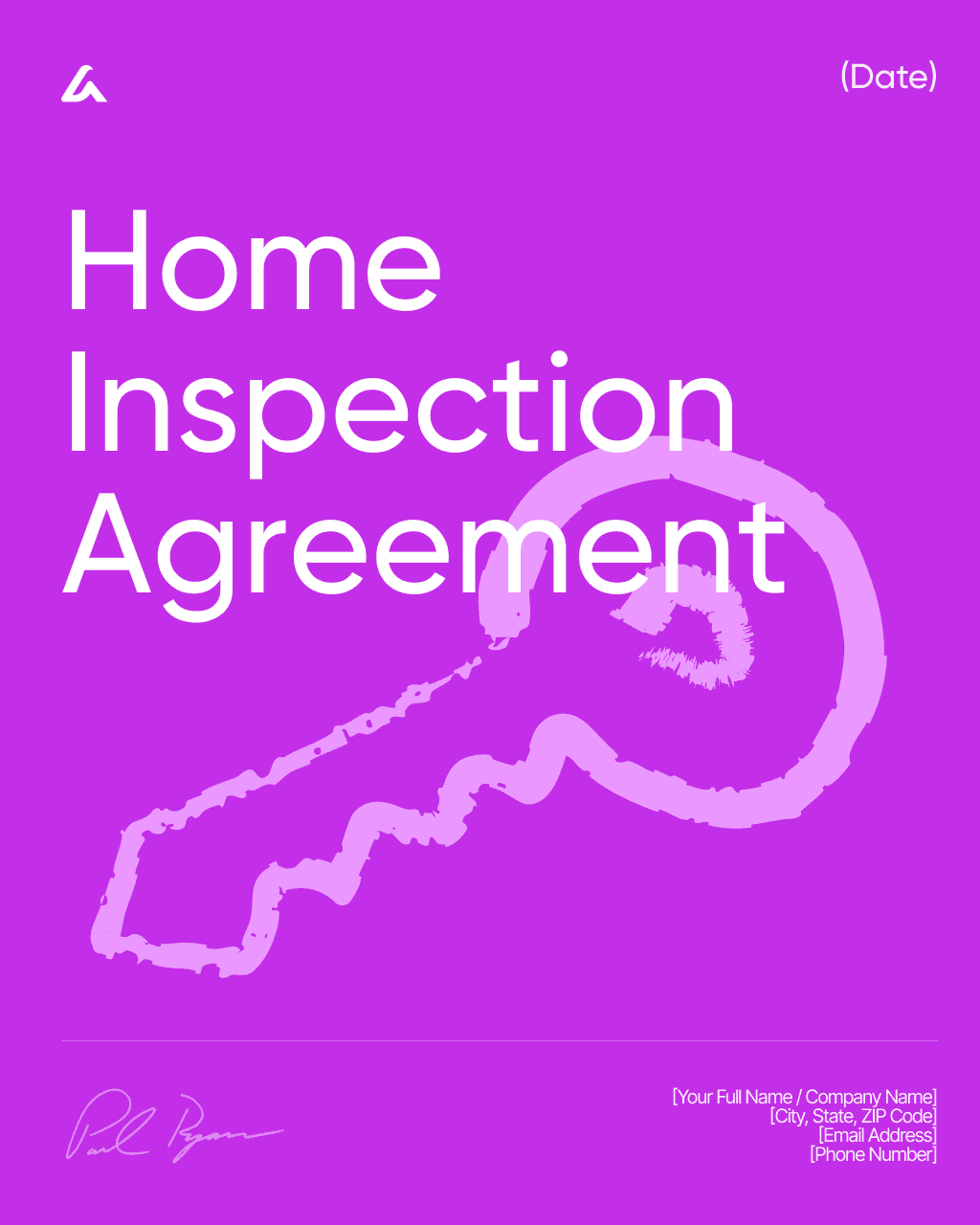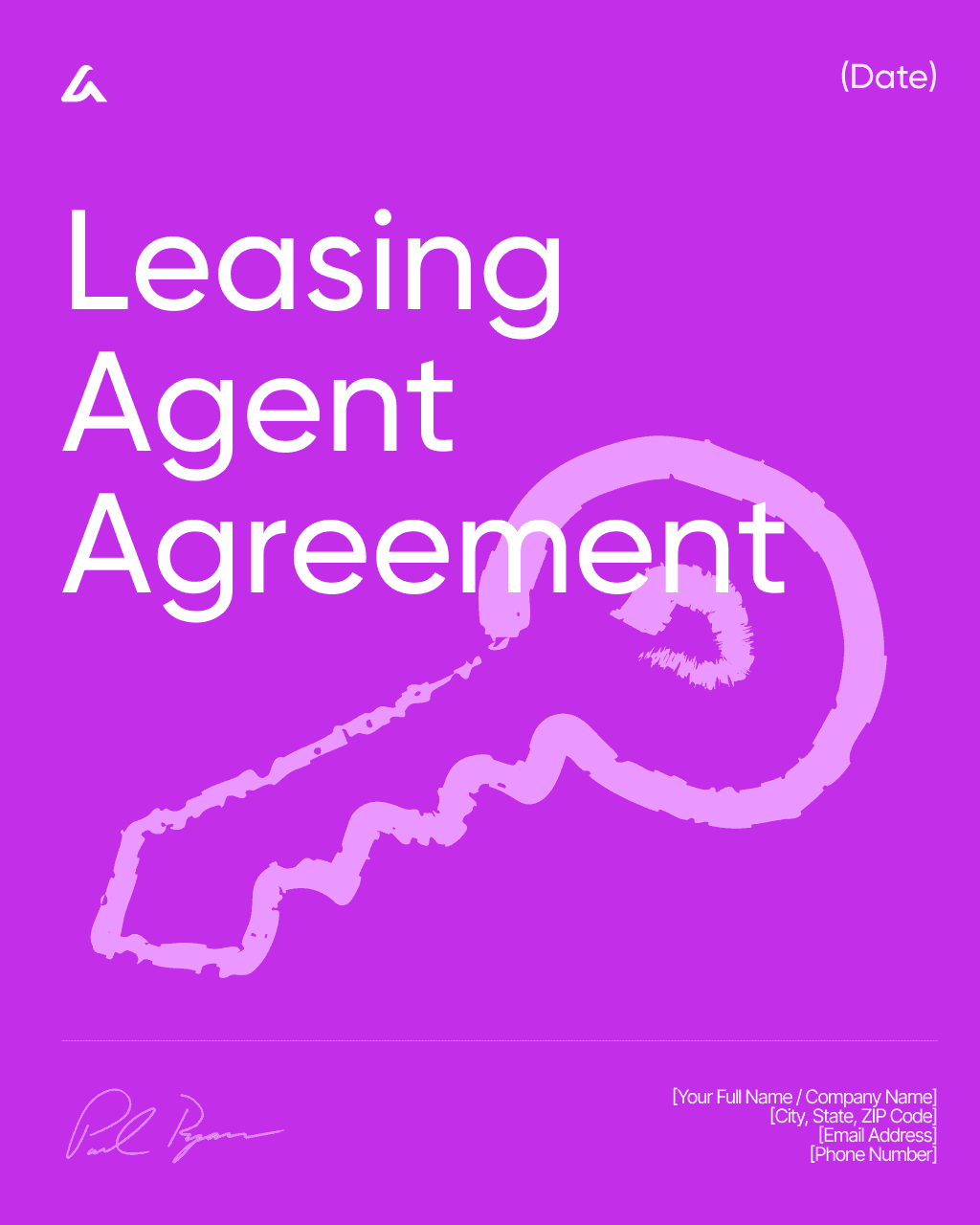Free template
Property Management Agreement Template – California
Draft your custom agreement in seconds with AI Lawyer
Download template
Property Management Agreement
This Property Management Agreement ("Agreement") is made and entered into on [Date], by and between:
Owner: [Property Owner’s Full Name / Company Name]
Address: [Owner’s Address]
and
Manager: [Property Manager’s Full Name / Company Name]
Address: [Manager’s Address]
Together referred to as the "Parties."
1. Property Description
The Owner appoints the Manager to manage the property located at [Full Address], including appurtenances, parking, and common areas (the “Property”). If the Property is part of an HOA, the Manager shall coordinate operations consistent with HOA rules and architectural guidelines.
2. Term
This Agreement begins on [Start Date] and continues until [End Date] unless earlier terminated under Section 9. If no End Date is specified, the Agreement renews month‑to‑month unless either Party provides [30] days’ written notice.
3. Scope of Services
The Manager will advertise vacancies using appropriate channels, screen applicants, prepare lease documents using Owner‑approved forms, collect rent and deposits, and enforce lease terms. The Manager will coordinate routine maintenance, obtain bids for non‑routine work above $[Threshold], and respond to habitability issues with priority. The Manager will maintain tenant files, digital records, and provide monthly financial statements with a rent roll, income/expense ledger, and bank reconciliation.
4. Manager Compensation
Compensation is ☐ [X]% of monthly gross collected rent ☐ Flat $[Amount] per month. Leasing fee: $[Amount] or [Y]% of one month’s rent for new tenancies; renewal fee: $[Amount] or [Z]%. Emergency after‑hours dispatch and project management above $[Capital Threshold] require Owner pre‑approval unless necessary to protect life, safety, or property.
5. Owner Responsibilities
Owner will provide proof of ownership, prior leases, warranties, service contracts, and disclosure documents. Owner shall fund an operating reserve of $[Reserve] to be held in Manager’s trust/operating account for repairs and expenses. Owner remains responsible for mortgage, taxes, and insurance premiums.
6. Financial Handling
Manager will deposit rents into a separate trust/operating account and pay authorized expenses from the account. Owner will receive monthly statements by [Delivery Method] and year‑end summaries suitable for tax preparation. All records will be available for inspection upon [X] business days’ notice.
7. Liability and Indemnification
Manager is not liable for losses arising from tenant acts, vendor actions, or property conditions unless due to Manager’s gross negligence or willful misconduct. Owner agrees to indemnify and hold Manager harmless for claims relating to the Property, except to the extent caused by Manager’s gross negligence or willful misconduct.
8. Insurance
Owner shall maintain property and liability insurance (minimum limits $[Limit]) and name Manager as additional insured and certificate holder. Owner will provide updated proof of coverage annually or upon request.
9. Termination
Either Party may terminate with [30] days’ written notice. For material breach, termination may be immediate. Upon termination, Manager will deliver keys, records, security‑deposit ledgers, and remaining funds within [X] business days.
10. Compliance and Notices
The Parties will comply with all applicable fair housing, anti‑discrimination, habitability, and privacy laws. Formal notices shall be delivered by personal service, certified mail, or recognized courier to the addresses above; email copies may be sent for convenience.
11. Governing Law; Entire Agreement
This Agreement is governed by the laws of [State/Country]. This document contains the entire agreement and may be amended only in a signed writing by both Parties. If any provision is held invalid, the remainder remains enforceable.
IN WITNESS WHEREOF, the Parties have executed this Property Management Agreement as of the date first written above.
Owner Signature
Name: __________________________
Date: __________________________
Manager Signature
Name: __________________________
Date: __________________________
No time to fill it up? Generate your custom agreement with AI Lawyer in seconds
Details
Learn more about
Property Management Agreement Template – California
California Property Management Agreement FAQ
What is a Property Management Agreement?
A Property Management Agreement is a legally binding contract between a property owner and a property manager or management company that defines the scope of services, responsibilities, and authority of the manager. It sets the framework for how the property will be operated, maintained, and rented out on the owner’s behalf. The agreement typically details how rent will be collected, how tenants will be managed, and how maintenance and repairs will be handled. It also specifies the manager’s compensation, reporting duties, and the duration of the contract.
In short, a Property Management Agreement ensures that both the owner and the manager understand their roles and expectations, providing clear rules for day-to-day management and helping prevent misunderstandings or legal disputes.
When to use a Property Management Agreement?
A Property Management Agreement should be used whenever a property owner hires another person or company to manage their property on their behalf. This includes situations where the manager is responsible for collecting rent, handling maintenance, finding or screening tenants, or overseeing daily operations.
The agreement is especially important if the manager has access to the owner’s funds or authority to make decisions regarding repairs, leases, or evictions. Having a written contract helps define the scope of responsibilities, prevent misunderstandings, and protect both parties legally.
Even if you’re working with someone you trust, a Property Management Agreement ensures that every term — from fees to termination rights — is clearly documented and enforceable.
What should be included in a Property Management Agreement?
A well-drafted Property Management Agreement should clearly outline all essential terms to protect both the property owner (or association) and the management company. It should include the following key components:
Parties involved: Identify the property owner or association and the management company entering into the agreement.
Property description: Specify the exact property or properties covered by the agreement.
Scope of services: Detail the manager’s responsibilities, such as budgeting, financial reporting, maintenance oversight, staff supervision, regulatory compliance, and tenant or owner communication.
Fees and payment structure: Explain how management fees are calculated — whether as a flat rate, a percentage of rent or assessments, or separate charges for specific services.
Term of the agreement: Define the length of the contract, renewal terms, and any automatic extensions.
Termination provisions: Describe how either party can end the agreement, including notice periods and valid reasons for early termination.
Insurance and liability: Outline required insurance coverage and include indemnification clauses to protect both parties.
Dispute resolution: Specify how disputes will be handled — for example, through mediation, arbitration, or legal proceedings.
Reporting requirements: Set expectations for financial statements, maintenance reports, and other updates, including how often they must be provided.
Together, these elements ensure that the agreement is transparent, enforceable, and fair to both sides.
Can a Property Management Agreement be changed after signing?
Yes, a Property Management Agreement can be changed after signing, but only if both parties agree to the modifications. Any changes — such as adjustments to management fees, responsibilities, or contract duration — should be made in writing through an official amendment or addendum to the original agreement.
Both the property owner and the management company must sign and date the amendment for it to be legally valid. Verbal agreements or informal promises are not enforceable and can lead to disputes.
It’s also good practice to review the original contract before making changes, as many agreements include specific clauses outlining how modifications must be handled. Keeping all amendments properly documented ensures clarity and legal protection for both parties.
How often should the property manager provide financial reports under the Property Management Agreement?
The Property Management Agreement should clearly specify how often the property manager must provide financial reports to the owner. In most cases, reports are delivered monthly, though some agreements require quarterly or even weekly updates depending on the property’s size and activity.
These reports typically include details about rent collected, operating expenses, maintenance costs, management fees, and net income. They may also include balance sheets or year-end summaries for tax purposes.
Setting a consistent reporting schedule in the agreement ensures transparency, helps the owner monitor financial performance, and builds accountability between both parties.
Similar templates

























































